Lochhead on Marketing
104 Languaging: How Category Designers Use Language to Change the Future
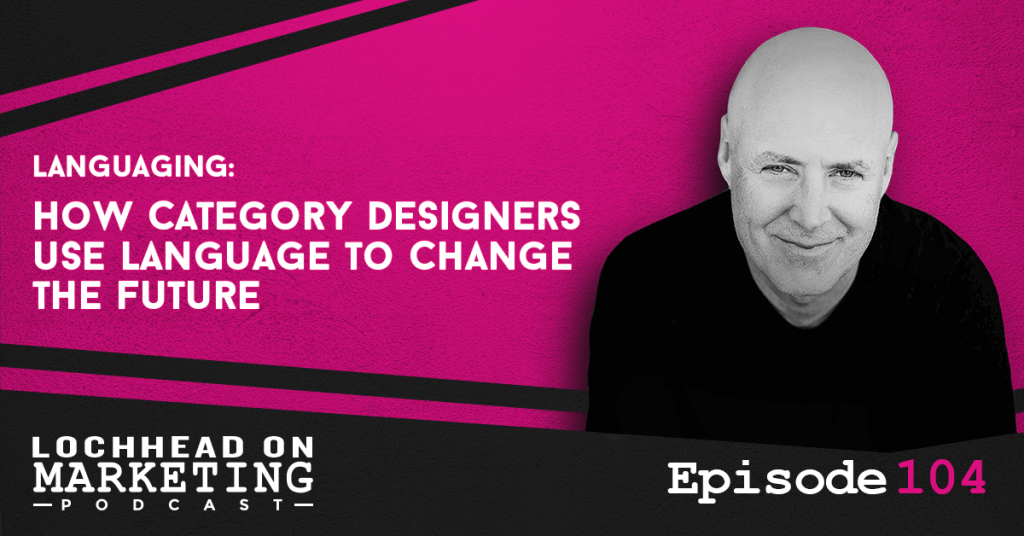
Podcast (lochheadonmarketing): Play in new window | Download (Duration: 7:19 — 5.0MB) | Embed
Subscribe: Apple Podcasts | Spotify | RSS | More
In this episode, Christopher Lochhead talks about language. Specifically, a concept that most entrepreneurs and marketers don’t know much about: Languaging.
Languaging and Creating Context
Languaging is the strategic use of words and language to change and create the future.
As any category designer worth their salt should know, how you frame a category could make or break them. Having a great context for your category is a must if you want to be ahead of the pack.
What better way to add a strategic context than to use statements that will make customers relate to your category. If you do it right, even just one sentence can propel you to the top.
Language and Differentiation
Christopher uses MP3s and Apple iPods to make his point. In the early 2000s, MP3 players had already been in the market for almost half a decade. Yet a lot of people were not using them, and a bigger portion of the population doesn’t even know what it was.
So when Apple launched the iPod in 2001, they had to find a way to get people to switch from their Walkmans to their new product.
To do this, Apple used strategic languaging to distinguish iPod from other MP3 players by calling it a digital music player. That’s differentiation.
To drive it all home, they have this one-sentence slogan that resonates with consumers.
One thousand songs in your pocket.
On his first Apple iPod press release, Steve Jobs made it very, very clear that Apple was absolutely designing a new category with its new product. It wasn’t just another MP3 player. He said:
“With iPod Apple has reinvented a whole new category of digital music player that lets you put your entire music collection in your pocket and listen to it wherever you go. With iPod listening to music will never be the same again.” – Steve Jobs
Apple redesigned the category and ran away with it by putting the technology in a context people could understand.
Frame it and Name it
It is important to note that language we use to describe something changes the thing, the way people see and value the thing.
So what does this mean for category designers? Legendary category designers frame it and name it. Legendary category designers can and do change the future with one sentence.
If you start listening for languaging, which you could think of as the strategic use of words and language to change thinking, you’ll start to notice it more often.
“Remember, a demarcation point in language creates a demarcation point in thinking which creates a demarcation point in perceived value, and action.” – Christopher Lochhead
Bio
Christopher Lochhead is a #1 Apple podcaster and #1 Amazon bestselling co-author of books: Niche Down and Play Bigger.
He has been an advisor to over 50 venture-backed startups; a former three-time Silicon Valley public company CMO and an entrepreneur.
Furthermore, he has been called “one of the best minds in marketing” by The Marketing Journal, a “Human Exclamation Point” by Fast Company, a “quasar” by NBA legend Bill Walton and “off-putting to some” by The Economist.
In addition, he served as a chief marketing officer of software juggernaut Mercury Interactive. Hewlett-Packard acquired the company in 2006, for $4.5 billion.
He also co-founded the marketing consulting firm LOCHHEAD; the founding CMO of Internet consulting firm Scient, and served as head of marketing at the CRM software firm Vantive.
We hope you enjoyed this episode of Lochhead on Marketing™! Christopher loves hearing from his listeners. Feel free to email him, connect on Facebook, Twitter, Instagram, and subscribe on Apple Podcast! You may also subscribe to his newsletter, The Difference, for some amazing content.
103 Digital Products, NFTs, Clubhouse, Oh My with Jason DeFillippo
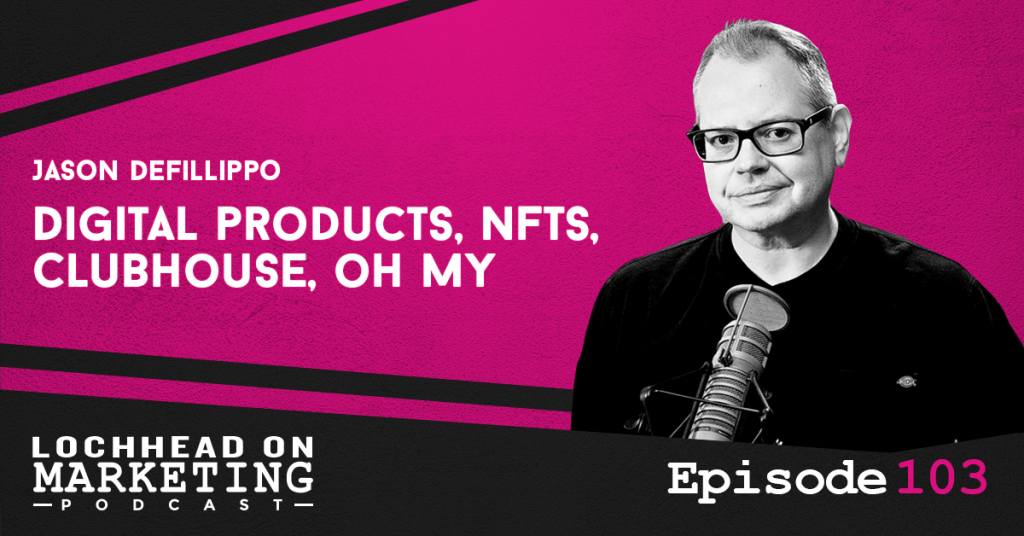
Podcast (lochheadonmarketing): Play in new window | Download (Duration: 40:01 — 27.5MB) | Embed
Subscribe: Apple Podcasts | Spotify | RSS | More
In the last episode, Christopher popped the hood on digital products, more specifically about NFTs or Non-Fungible Tokens. As you may know, a 10-second GIF recently just sold for $6.6M. This was due to NFTs.
Now, there are other companies and celebrities jumping in on it. Jack Dorsey, the founder of Twitter, is now auctioning off the first tweet for $2.5M, as of this taping. Rock band Kings of Leon is set to be the first band releasing a record as an NFT. These cyber collectibles are taking off and having a profound impact.
Yet our producer, Jason DeFillippo, has some questions. Jason is the greatest of all time in podcast producers, and he’s worked with Tim Ferriss, Jordan Harbinger and many others. He also hosts one of the greatest podcasts ever, Grumpy Old Geeks. He also has a lot of experience in the art world, as he worked with his dad for a long time. Jason has an opinion about NFTs, and he and Christopher talk about that, Clubhouse, and a bunch of other fun things.
Digital Products have been Here Forever
Jason DeFillippo comments about Christopher’s statement about digital products and NFTs being a category-defining moment. For someone who has played online games like Jason, digital products have been around since the early 2000s. People have been buying and selling digital items to use in-game, and there’s even a whole industry built on farming in-game currency for it.
As for NFTs, Jason doesn’t see the purpose to all of it other than being a rich man’s game. It’s like buying a pet rock, but at least with the pet rock you get a rock for your troubles.
“We had this kind of shit back in the day, 10 years ago, and we would buy digital items, we would buy digital clothes, we would mine gold. It was Bitcoin before there was Bitcoin, and it was just a bunch of nerds sitting around killing orcs. There was a purpose to the NF T’s back then, because it was all in-game. Now we have all of the crap that you know was the digital stuff, but no game to play. Today’s NF T is one of those things that to somebody like myself with a highly tuned bullshit detector made my head explode.” – Jason DeFilliippo
On Digital Natives Buying Digital Products
Christopher asks if it makes sense that native digital people are buying more digital products than physical ones. Jason thinks it is, but it again depends on the purpose of the purchase. It depends on the context of why they bought the item, either to make their digital home look better, or have the best weapon for a game they’re playing.
Again, NFTs miss the mark in this regard. Jason thinks that this $6.6M purchase just got overhyped because people are looking for excitement. That, and because it is attached to blockchain. So people who are looking for the next big thing are suddenly scrambling to see if NFTs fit the bill. According to Jason, it doesn’t.
“That’s the problem with it. It doesn’t make any sense. I think it’s a fad. This has all of the hallmarks of us being stuck inside for far too long. We need something to excite us. It’s on the blockchain. You know, if they could just sprinkle in some AI, we would have like a BS trifecta here.” – Jason DeFillippo
Why is Clubhouse a Thing?
Christopher and Jason discuss the app Clubhouse, and why it’s even a thing. For one thing, the features it has is already present in various other apps, like Discord and other online voice chat software. What makes it weirder is that it is trying to bring back the feeling of radio, something that podcasts have killed a long time ago.
The appeal to some comes from the fact that it is invite-only. Though that in itself is not a unique feature, as Jason points out. There are a lot of apps that can just integrate such features into their own well-established ones. It’s why Jason thinks that Clubhouse will come to a quick demise soon.
“My buddy John Wall of Marketing Over Coffee was quick to point out that as a creator, there’s no value here. First of all, I got to be Live. So it’s just like radio. Instead of podcasting, where we do it now and release it later, you got to be live. So as a creator, you’re fucked on that. So you have to be there, you have to do a radio show, and as a user you have to be there for that specific time.” – Christopher Lochhead
“I’ve been invited to like two dozen clubhouse chats. I’m like, it’s 3:30 in the afternoon on a Tuesday, I have a job. They want to do it at like 10:30 at night, I’m like, I gotta sleep. It doesn’t make any sense.
The other side is there’s no discoverability, finding a room is terribly hard, and the audio quality sucks. They say you’re not allowed to record it, but everybody records it. And you know, there’s, there’s so many things wrong with it, it’s hard to begin to figure out where the most wrong thing is wrong with it” – Jason DeFillippo
To hear more about Christopher and Jason’s thoughts on digital products, NFTs, and Clubhouse, download and listen to this episode.
Bio
Jason DeFillippo
Jason has been building websites since the early days in 1994 for clients that range from small businesses to million-dollar websites for blockbuster films to his own start-ups.
In 1995 a new media company in Santa Monica moved him out to Los Angeles to build the first website for Epson America.
Since then, Jason has launched over 250 websites for major corporations like Paramount Pictures, Sony, Warner Brothers, and Disney.
He also created the two-time SXSW Weblog Award-winning Blogrolling.com as well as co-founded the global blog network Metroblogging.
He has worked at several startups in San Francisco including Technorati.com and 8020 Media, the publishers of JPGMagazine.com and statistical aggregator Metricly.com.
Currently, Jason is a full-time podcast producer and editor.
Links
We hope you enjoyed this episode of Lochhead on Marketing™! Christopher loves hearing from his listeners. Feel free to email him, connect on Facebook, Twitter, Instagram, and subscribe on iTunes! You may also subscribe to his newsletter, The Difference, for some amazing content.
102 The Future Just Changed and Most People Missed It
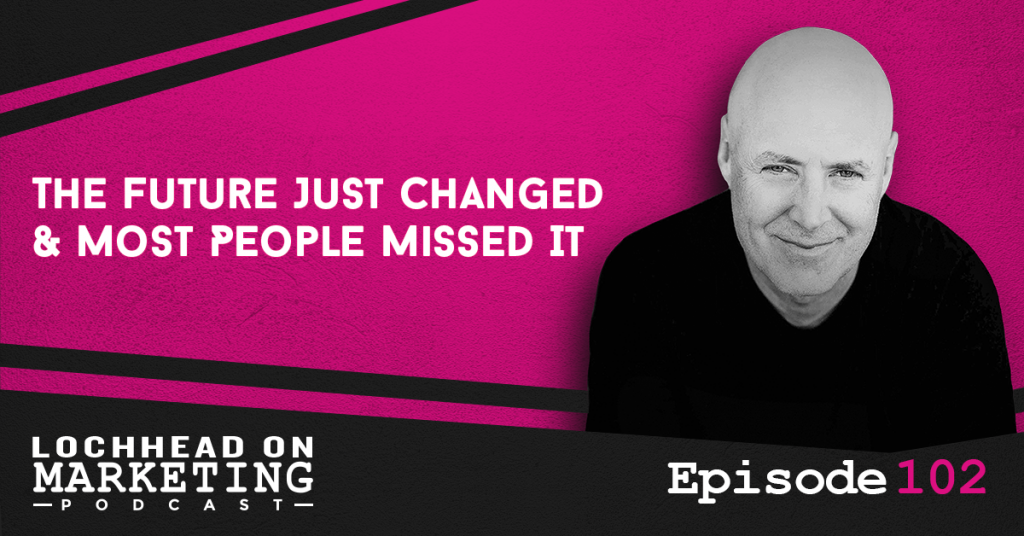
Podcast (lochheadonmarketing): Play in new window | Download (Duration: 13:36 — 9.3MB) | Embed
Subscribe: Apple Podcasts | Spotify | RSS | More
In October 2020, a 10-second video clip sold for $67,000. Just recently, that same 10-second video sold for $6.6 Million. This selling of a piece of digital art changed the future… and most people didn’t even notice.
This new category design could have profound implications in the art world of art – and soon, everywhere else! So in this episode, Christopher Lochhead talks about digital-exclusive products, how it can be the next mega-category, and how it can affect your business and brand in the future.
Prioritizing Your “Real Life”
As the age of digitization continues to evolve, people find themselves becoming more invested in their digital life. If you’re between thirty or thirty-five, you’re probably a digital native. Everyone below that are definitely digital natives: those who spend most of their time online and connected digitally.
The big AHA moment here for Christopher is that digital natives prioritize their digital life more than their physical life. It is almost as if their digital life is their “real life”, therefore it has more value for them.
“If you’re a digital native, the AHA here is your digital life is more important than your physical life. If you’re a digital native, you’re having the opposite experience that someone like me. Someone who believes my primary experience in life is a physical one, but it’s supplemented with a rich digital life. But if you’re my buddies and their kids, your real life is the digital life and the ocean and the sunset are an interruption to your real life. That was a profound moment for me. I understood at that moment the difference between digital natives and non-digital natives were 180 degrees different.” – Christopher Lochhead
Digital-Exclusive Products as a Mega Category
Digital products have been around for quite some time. There are games that sell digital clothes to make your avatar look good or play better. However, this 10-second digital media clip that sold for $6.6 million dollars in an NFTE auction classifies as category design.
This new art category design is changing the definition of the category of what it means to be an artist and what a piece of art means in the digital age. Art is now a new digital category; it’s not only physical anymore. Who’s to say that other products won’t follow suit in the future?
“In the past, people would pay six point six million dollars for a painting, not a bunch of zeros and ones. This is a way bigger development than somebody paying a few dollars to buy a digital tractor or a rifle in a video game. Someone paid over six fucking million dollars for some zeros and ones, and those zeros and ones are artificially being restricted. In this case, they paid that money so they’d be the only people in the world to have those zeros and ones.” – Christopher Lochhead
All of these circle back to digital natives and how they prioritize things. It is why you see people being reluctant to buy a car but willingly fork over money for a digital vehicle in an app. They want to live out their best lives in their perceived “real life”.
“If you’re a digital native, your digital life by default is more important and more valuable to you than your physical life. If that’s true, it stands to reason that digital native’s want to buy shit for their digital native selves and they’ll buy things in their digital world that they wouldn’t buy in their physical world.” – Christopher Lochhead
Should You Ride the Digital Wave?
So what does that mean for companies and their corresponding categories and brands? Well, if you want to stay ahead of the pack, you need to step back and think about the increasing role of people’s digital lives in the market. Especially in the new marketing landscape that COVID has wrought, where people live in a digital workplace in a way that they didn’t before.
“I think we have to ask ourselves: is there an opportunity and or threat for our categories, brands and businesses in a world where people’s digital life is their primary experience and their physical life is their secondary experience?” – Christopher Lochhead
To know more on digital-exclusive products as a new mega-category, download and listen to this episode.
Bio
Christopher Lochhead is a #1 Apple podcaster and #1 Amazon bestselling co-author of books: Niche Down and Play Bigger.
He has been an advisor to over 50 venture-backed startups; a former three-time Silicon Valley public company CMO and an entrepreneur.
Furthermore, he has been called “one of the best minds in marketing” by The Marketing Journal, a “Human Exclamation Point” by Fast Company, a “quasar” by NBA legend Bill Walton and “off-putting to some” by The Economist.
In addition, he served as a chief marketing officer of software juggernaut Mercury Interactive. Hewlett-Packard acquired the company in 2006, for $4.5 billion.
He also co-founded the marketing consulting firm LOCHHEAD; the founding CMO of Internet consulting firm Scient, and served as head of marketing at the CRM software firm Vantive.
We hope you enjoyed this episode of Lochhead on Marketing™! Christopher loves hearing from his listeners. Feel free to email him, connect on Facebook, Twitter, Instagram, and subscribe on Apple Podcast! You may also subscribe to his newsletter, The Difference, for some amazing content.
101 Category Design Scorecard
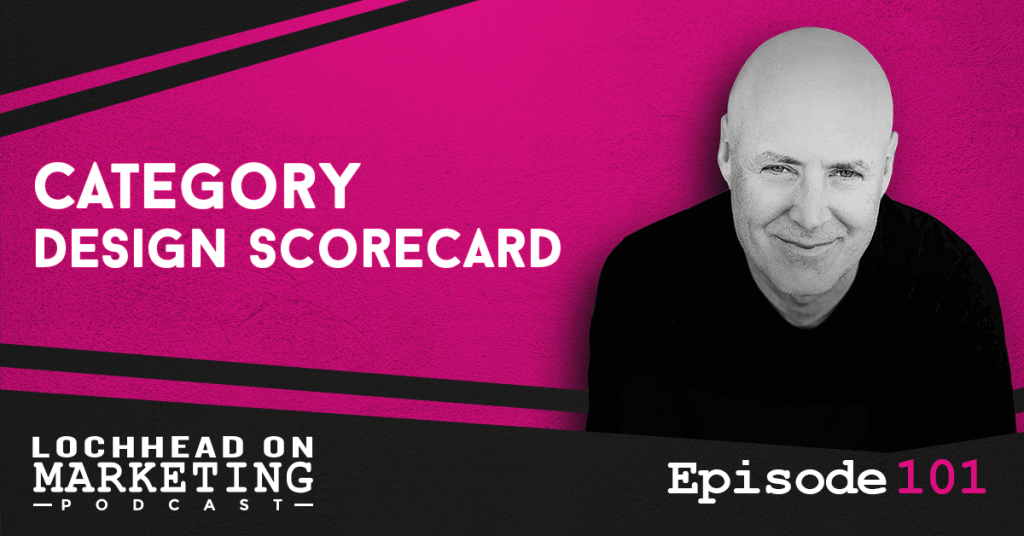
Podcast (lochheadonmarketing): Play in new window | Download (Duration: 20:28 — 14.0MB) | Embed
Subscribe: Apple Podcasts | Spotify | RSS | More
This episode talks about the Category Design Scorecard and how you can use it to spot a Category Designer. It also breaks down how you can evaluate a company’s ability to create a new category or redesign an existing one.
Christopher and his Category co-pirates, Eddie Yoon and Nicholas Cole, just unveiled this new Category Design Scorecard. It is based on a tremendous amount of primary research, and they can’t wait to share it with all of you.
How the Category Design Scorecard Came to be
The episode starts off by explaining why they created the Category Design Scorecard. Christopher, Eddie, and Nicholas wanted something that can distinguish a company that is a category designer or creator from a high growth company fighting tooth and nail for market share in their existing category.
We analyzed Fortune magazine’s 100 fastest-growing companies list for over a decade. Were there certain things that companies are trying to design and dominate a new category? They were easily distinguishable from other high growth companies due to certain things they said. So we picked the Fortune 100 fastest growers list over a decade. What we discovered as we began to dig into the data are five key indicators. Those five key indicators distinguished category designers from other successful companies. – Christopher Lochhead
The Five Components of the Category Design Scorecard
Christopher then enumerates the five components of their new Category Design Scorecard, and they are as follows:
1. Category POV
Does the company have a clear “Point of View” of their category?
Are they able to frame a powerful problem, articulate a compelling vision, and most importantly, communicate the core compromises, trade-offs, and problems inherent to the way the category is today, but in such a way that the consumer/customer will be open to a new and different approach.
Category designers have a very specific way of doing it; which is they are going after something that they see as a noble cause, a noble purpose, or a giant problem worth solving. It’s either a problem that we didn’t know that we had, that they’re educating us about, or it’s an existing problem that they meaningfully reimagine it in a new context. – Christopher Lochhead
2. Future Category Reimagined and Without Compromise
Does the company cast a compelling future — free of any fundamental problems, compromises, and trade-offs inherent to the category as it is today?
We’ve learned a lot from our friend Joe Pine, who is one of the co-authors of The Experience Economy. One of the things that he teaches us is that companies that are successful in doing this transform their customers, transform their partners, and as a result of bringing new things to the world, they generate a tremendous amount of abundance. So the second criteria is, are they articulating a future category in a reimagined way without compromise? If they do, can the future category break new grounds and get us an exponential kind of future? – Christopher Lochhead
3. Radically Different Offer + Business Model
How does this new category get delivered to the customer? Is it both through a breakthrough product/service/offer, but also through a breakthrough business model?
How does product innovation and business model innovation come together in a way where 1 + 1 = 11?
There has to be something radically different about either the product offer, the business model, or both. – Christopher Lochhead
4. The Data Flywheel
Does the company generate data about customer/consumer with demand/preferences that creates a unique opportunity and advantage to anticipate the future of consumer demand and any category shifts?
Will this Data Flywheel provide insight into not only how to improve company offerings, but predict where demand for this new category will unfold next?
One of the big insights in Superconsumers is a relatively small percentage of the most enthusiastic consumers are customers that drive any category change. So another thing to think about is, does the flywheel produce insights into Superconsumers, and not just everyday customers? This allows a company to be very predictive about going forward. – Christopher Lochhead
5. Depth & Degree of Customer Outcomes
Does the company generate satisfied customers/consumers?
Are customers so happy and satisfied they evangelize the product/service to others? Better yet, do customers want to tell their own stories where the customer’s life is truly different after engaging with the company?
The degree to which a customer has a massive outcome, particularly an outcome that drives massive word of mouth. When your outcome drives word of mouth, and you have a compelling category point of view, you’re actually telling your customers what to say as they go share it with their friends.– Christopher Lochhead
To know more on how the 100 fastest-growing companies fare in the Category Design Scorecard, download this episode.
Bio
Christopher Lochhead is a #1 Apple podcaster and #1 Amazon bestselling co-author of books: Niche Down and Play Bigger.
He has been an advisor to over 50 venture-backed startups; a former three-time Silicon Valley public company CMO and an entrepreneur.
Furthermore, he has been called “one of the best minds in marketing” by The Marketing Journal, a “Human Exclamation Point” by Fast Company, a “quasar” by NBA legend Bill Walton and “off-putting to some” by The Economist.
In addition, he served as a chief marketing officer of software juggernaut Mercury Interactive. Hewlett-Packard acquired the company in 2006, for $4.5 billion.
He also co-founded the marketing consulting firm LOCHHEAD; the founding CMO of Internet consulting firm Scient, and served as head of marketing at the CRM software firm Vantive.
We hope you enjoyed this episode of Lochhead on Marketing™! Christopher loves hearing from his listeners. Feel free to email him, connect on Facebook, Twitter, Instagram, and subscribe on Apple Podcast! You may also subscribe to his newsletter, The Difference, for some amazing content.
100 How To Write A Legendary Brand Story w/ Park Howell
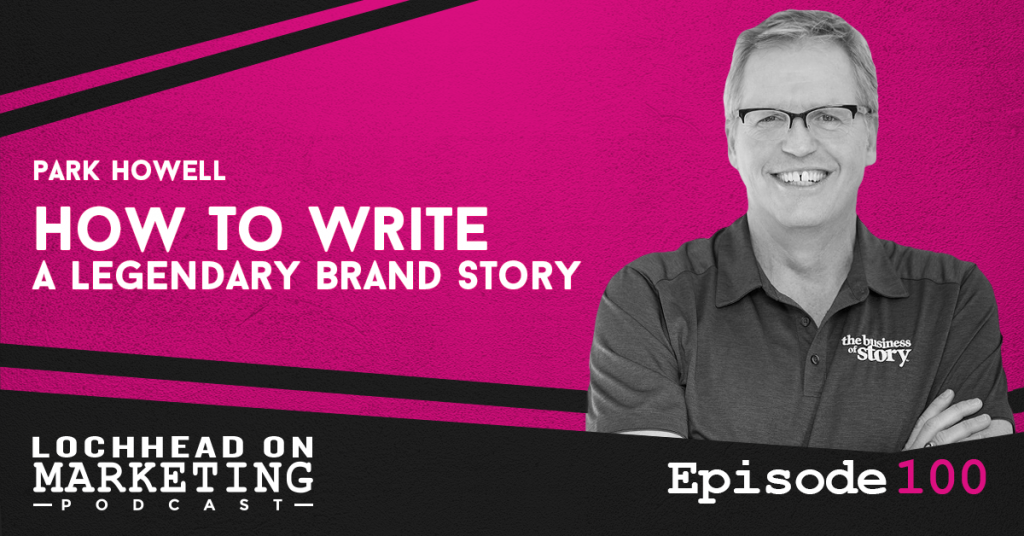
Podcast (lochheadonmarketing): Play in new window | Download (Duration: 40:07 — 27.5MB) | Embed
Subscribe: Apple Podcasts | Spotify | RSS | More
Stories are incredibly powerful. It is legendary. People fall in love based on the stories they tell themselves about each other. People go to war and start countries over stories. Furthermore, when stories are used to design a category and a brand, it creates massive enduring value.
In this episode of Lochhead on Marketing, we talk to the guru of the business of story himself, Park Howell, to educate us on how to construct legendary marketing stories and how story marketing and category design actually come together. Park also shares his fantastic thoughts on nursery rhymes and the Gettysburg address.
What Marketers Get Wrong About Storytelling
Most marketers are not award-winning screenwriters, they’re not great at long-form content like in Hollywood and Pixar. Park discusses how marketing comes down to just three words, one framework that is built on: and, but, and therefore (ABT). This perfect three-act structure is a complete customer framework that will allow the connection to the customer on an empathetic level and help develop the contrast in their problems.
“I’ve learned that this framework hooks the subconscious of your audience, which is always looking for this fight or flight. It’s a problem-solution dynamic that you are playing to the natural way your audience’s brain creates meaning. Now what a lot of people do is they start with the problem in the ‘and’ statement. Start with the aspiration, what is it that your customer wants and then insert the problem in your ‘but’ statement. Therefore, here’s my solution on how to help you get that. And the trick here is to have as much contrast between that aspiration and that problem as possible. A short, succinct, and specific contrast. If you do that, your audience will give you all the time you need in your therefore solution.” – Park Howell
How to End Up with A Captivating Story
Park encourages everyone to start in the middle through the ‘but’ statement and then proceed to answer the singular problem that needs to be solved. Once the singular problem is determined and boiled down, then jump to the ‘and’ statement, the specific audience, and lastly the ‘therefore statement’. Following the ABT framework can lead to amazing and captivating brand and founder stories.
He discusses that when somebody articulates the customer’s problem powerfully and effectively, the human brain makes the assumption that the person by definition must have the solution.
“A good story can kill a bad product quicker than anything. If you’ve got a great founder story, well told that has nothing to do with the product or offering, you create a disconnect there. There are a ton of those stories out there that have gone untold, and they are like gold sitting below your feet. You just have to unearth them and tell them well, but it has to tie to your why it is you do and what you do in your business. Huge believer in that.” – Park Howell
How Story Marketing and Category Design Unite
Christopher and Park discuss how to create legendary stories in context to the use of category design. Park comments one can do this by getting the ABT super focused so nobody can share the same ABT. Along with a little shadow on the category design, this little algorithm tool can help separate and differentiate from the competitors.
Park also discusses how the Gettysburg address and nursery rhymes all used ABT in their brilliant storytelling.
“If you go to the Gettysburg address, you’ll see the Gettysburg address is a perfect and, but, therefore. Lincoln steps on stage and addresses the GRA crowd. Exactly two minutes, 272 words. Yet it’s one of the most iconic, legendary leader addresses of all time. If you look at it, it’s set up in a perfect and, but, and therefore for him to give. He was just a brilliant storyteller. He knew the power of contradiction and consequence, and that’s what he was delivering that day. If you look at any nursery rhymer, most 90% of all nursery rhymes are an ABT.” – Park Howell
To know more about Park Howell and how to construct legendary marketing stories, download and listen to this episode.
Bio:
Park Howell is a 30+ year veteran of the advertising industry who has guided hundreds of purpose-driven brands and thousands of people who support them to substantial growth.
But everything changed in 2006. That’s when he realized the advertising paradigm was being disrupted by the internet. Brands used to own the influence of mass media, but the masses had become the media creating a cacophony of communication.
Park learned that an anecdote is the antidote to help you stand out.
He now consults, teaches, coaches, and speaks internationally helping leaders and communicators rise above the noise of the Attention Economy and be heard using the power of the brand and business storytelling.
Many so-called storytelling experts tell you why story is important in business. Park actually shows you how to storytell.
Audiences are bewitched by his interactive keynotes, panel discussions and workshops.
Links:
We hope you enjoyed this episode of Lochhead on Marketing™! Christopher loves hearing from his listeners. Feel free to email him, connect on Facebook, Twitter, Instagram and subscribe on iTunes! You may also subscribe to his newsletter, The Difference, for some amazing content.
***
Following an exercise out of Lochhead’s playbook (we’re always on the lookout for new ways to make our Story Cycle system more powerful for brands that choose to leverage it), we arrived at the ideal market category design for their new product.
Here is the script we created to design their new category:
How many times do you breathe each day?
About 20,000 inhales and exhales.
And that’s not always easy if you suffer from airborne allergens.
Some 50 million Americans do.
75% of which still rely on over-the-counter medications.
But they don’t realize that these drugs are often ineffective and…
could be making them even sicker.
WebMD lists 34 side effects to common allergy meds, including dry mouth, drowsiness, itching, irritability and nightmares.
But they don’t mention what other studies have found.
That prescription and OTC allergy drugs can lead to cognitive impairment.
Including a lowered IQ and potential increases in dementia and Alzheimers.
When it comes to understanding the true impacts of allergy meds, Americans are suffering from a severe case of…
…Mental mucus.
UNTIL NOW!
Introducing Airloom™ for “Conscious Allergy Relief”
Airloom™ is the smartest, all-natural support for allergy season, with the most potent herbal supplement formulation designed for people mindful toward their mind and body.
It’s small-batch, fresh allergy relief centered on clearing the air about the environmental and big pharma impacts of allergy season on you.
So you can…
Inhale a healthy dose of life again.
099 Why CMOs Get Fired: Results Do Not Equal No Results Plus An Excuse
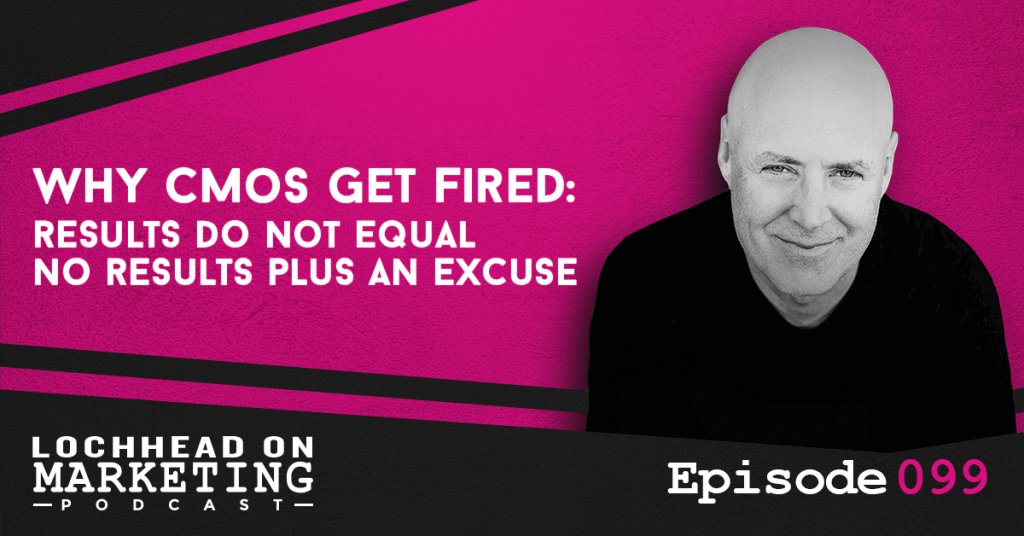
Podcast (lochheadonmarketing): Play in new window | Download (Duration: 15:26 — 10.6MB) | Embed
Subscribe: Apple Podcasts | Spotify | RSS | More
On this episode, let’s talk about producing legendary results in the context of CMO tenure. According to the Wall Street Journal, based on research from Spencer Stewart, the median tenure of a CMO was only 27 and a half months in 2019, which was down from 31 months in 2017. This is in stark contrast to the CEO’s average tenure of 88.4 months or about seven and a half years. CFOs have roughly 63 months or nearly five and a half years.
Success is about producing legendary results. So on this episode, let’s talk about that.
Marketing Is A Constant Revolving Door
One legendary marketing consultant in Silicon Valley and friend of Christopher says that marketing is now a constant revolving door. CMO tenure is down to more or less two years and across all levels in the marketing department. Covid-19 made matters worse and we ask, what is driving this “revolving door”?
“One of them is, everybody in marketing is very busy all the time, very frenzied in a stimulus-response like we’re trying to win the activity contest. Success in business is not about winning the activity contest. As a matter of fact, activity does not equal to results. So yes, shave the dog.” – Christopher Lochhead
Results Do Not Equal No Results Plus An Excuse
The big aha here is results do not equal no results, plus an excuse. Christopher describes sales as binary, you either hit the numbers, exceed the numbers or do not hit the numbers. It is the sole indicator that you are doing well, but this should not be the case for marketers.
“As a CEO, you live and die by the numbers. Every quarter, as the head of sales, chief revenue, officer, VP of sales, whatever title it is, head of sales, that’s true too. The reality is, that should be true in marketing as well. This sort of leads us to the question, what are the marketing results that matter?” – Christopher Lochhead
Marketing Results That Matter
There are lots of things that marketing do so in this episode, Christopher discusses the results that matter. There are only three things that marketing organizations should be focused on:
“Number one, design and dominate a category that matters. Number two drive revenue near term midterm and longterm. And number three, create enduring value as measured by market cap or company valuation. We want to be creating the most valuable company in a category that matters.” – Christopher Lochhead
To know more about the three marketing results that matter, download and listen to this episode.
Bio:
Christopher Lochhead is a #1 Apple podcaster and #1 Amazon bestselling co-author of books: Niche Down and Play Bigger.
He has been an advisor to over 50 venture-backed startups; a former three-time Silicon Valley public company CMO and an entrepreneur.
Furthermore, he has been called “one of the best minds in marketing” by The Marketing Journal, a “Human Exclamation Point” by Fast Company, a “quasar” by NBA legend Bill Walton and “off-putting to some” by The Economist.
In addition, he served as a chief marketing officer of software juggernaut Mercury Interactive. Hewlett-Packard acquired the company in 2006, for $4.5 billion.
He also co-founded the marketing consulting firm LOCHHEAD; was the founding CMO of Internet consulting firm Scient, and served as head of marketing at the CRM software firm Vantive.
We hope you enjoyed this episode of Lochhead on Marketing™! Christopher loves hearing from his listeners. Feel free to email him, connect on Facebook, Twitter, Instagram, and subscribe on Apple Podcast! You may also subscribe to his newsletter, The Difference, for some amazing content.
098 Social Media Marketing Lie: You Have Be Everywhere on Every Platform 100 Times a Day
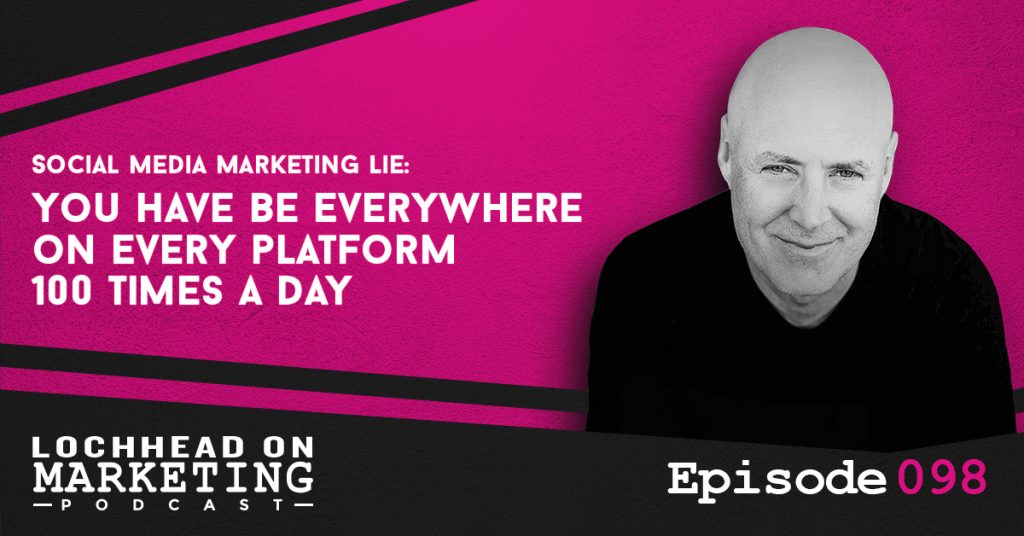
Podcast (lochheadonmarketing): Play in new window | Download (Duration: 14:57 — 10.3MB) | Embed
Subscribe: Apple Podcasts | Spotify | RSS | More
In this episode, let’s talk about one of the dumbest social media marketing lies out there: you have to be everywhere on every platform and you need to put out a hundred pieces of content today. This is terrible advice and it will exhaust you and your marketing team and will piss off your prospects and customers. Ultimately, it will not help you become a category queen and king.
Bio:
Christopher Lochhead is a #1 Apple podcaster and #1 Amazon bestselling co-author of books: Niche Down and Play Bigger.
He has been an advisor to over 50 venture-backed startups; a former three-time Silicon Valley public company CMO and an entrepreneur.
Furthermore, he has been called “one of the best minds in marketing” by The Marketing Journal, a “Human Exclamation Point” by Fast Company, a “quasar” by NBA legend Bill Walton and “off-putting to some” by The Economist.
In addition, he served as a chief marketing officer of software juggernaut Mercury Interactive. Hewlett-Packard acquired the company in 2006, for $4.5 billion.
He also co-founded the marketing consulting firm LOCHHEAD; was the founding CMO of Internet consulting firm Scient, and served as head of marketing at the CRM software firm Vantive.
Links:
Legendary copywriter Ben Settle
Category King of History Podcasts Dan Carlin
We hope you enjoyed this episode of Lochhead on Marketing™! Christopher loves hearing from his listeners. Feel free to email him, connect on Facebook, Twitter, Instagram, and subscribe on Apple Podcast! You may also subscribe to his newsletter, The Difference, for some amazing content.
097 You Are What You Subscribe To
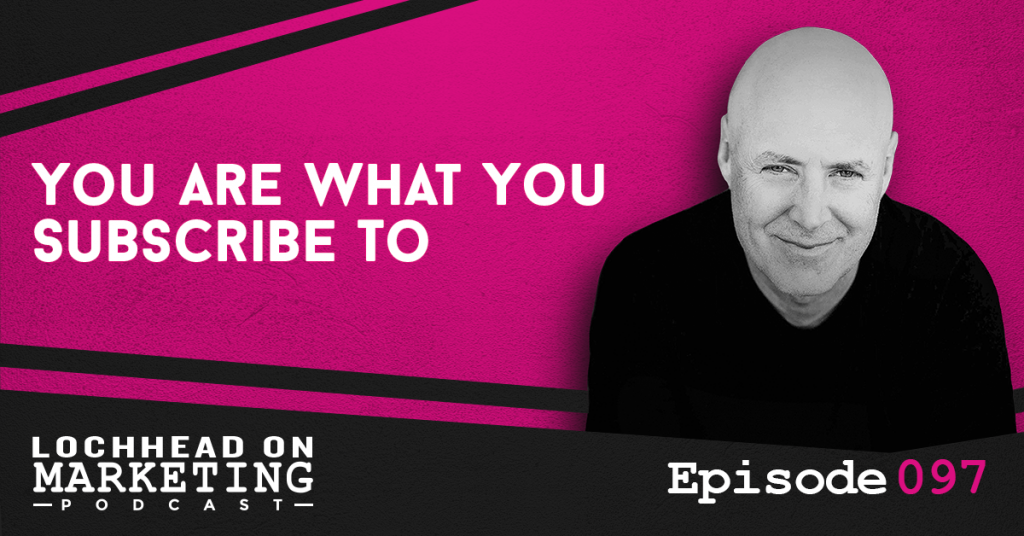
Podcast (lochheadonmarketing): Play in new window | Download (Duration: 10:23 — 7.1MB) | Embed
Subscribe: Apple Podcasts | Spotify | RSS | More
Today, let’s talk a little more about your career. My brother from another mother and co-creator of our new newsletter category pirates, Nicholas Cole has an interesting insight: “you are what you subscribe to.” Christopher thinks he’s right.
So in this episode, find out what media Christopher consumes that he finds life-changing.
“The content we subscribed to, the content we consume, it affects how and what we think about. Our thoughts affect our actions and our actions affect our outcomes, both professionally and personally.” – Christopher Lochhead
F*ck The Hustle Porn Stars
If you’ve been a long time listener, you would know that Christopher is not a fan of these hustle porn stars. He does not believe in hustlin’ all your life. Instead, Christopher pushes for being different and legendary.
“Porn stars say no one ever worked himself to death. Well in Japan, they have a word for it. It’s called Karoshi and it translates into death by overwork. Maybe you can hustle all you want, but there’s a difference between hard work and smart work.” – Christopher Lochhead
Choose What You Consume
We have very limited spaces in our brains so Christopher encourages you to choose what you read and listen to. He gives out a few recommendations such as below:
The OGS
- Peter Drucker – The Effective Executive
- David Ogilvy
New Thought Leaders
- Malcolm Gladwell – The Masterclass
- John Wall and Christopher Penn – Marketing Over Coffee Podcast
- Mike Maples Jr. – Starting Greatness Podcast
- Paul Martino and Randy Komisar – No Bull: Life-Changing Conversations with Bill Campbell
B2B World
- Dave Gearhart – B2B Marketing Leaders Podcast
- Brian Burns – B2B Revenue Leadership Podcast
- Russell Brunson – The Secret Series (Books and Podcast)
A Couple of Key Questions
Those life-changing books and podcasts are just a couple to think about. Moreover, Christopher is encouraging you to sit down and ask yourself a couple of key questions:
“What’s the kind of content I love? What do I most want to learn in the next 12 months? What should I stop consuming? What should I start consuming? And remember, be very careful whose ideas you let into your head because your thoughts become your actions, your actions become your outcomes and your outcomes become your life.” – Christopher Lochhead
To know more about why you are what you subscribe to, download and listen to this episode.
Bio:
Christopher Lochhead is a #1 Apple podcaster and #1 Amazon bestselling co-author of books: Niche Down and Play Bigger.
He has been an advisor to over 50 venture-backed startups; a former three-time Silicon Valley public company CMO and an entrepreneur.
Furthermore, he has been called “one of the best minds in marketing” by The Marketing Journal, a “Human Exclamation Point” by Fast Company, a “quasar” by NBA legend Bill Walton and “off-putting to some” by The Economist.
In addition, he served as a chief marketing officer of software juggernaut Mercury Interactive. Hewlett-Packard acquired the company in 2006, for $4.5 billion.
He also co-founded the marketing consulting firm LOCHHEAD; was the founding CMO of Internet consulting firm Scient, and served as head of marketing at the CRM software firm Vantive.
We hope you enjoyed this episode of Lochhead on Marketing™! Christopher loves hearing from his listeners. Feel free to email him, connect on Facebook, Twitter, Instagram, and subscribe on Apple Podcast! You may also subscribe to his newsletter, The Difference, for some amazing content.
096 Silicon Valley’s Secret Marketing Assassin Rick Bennett
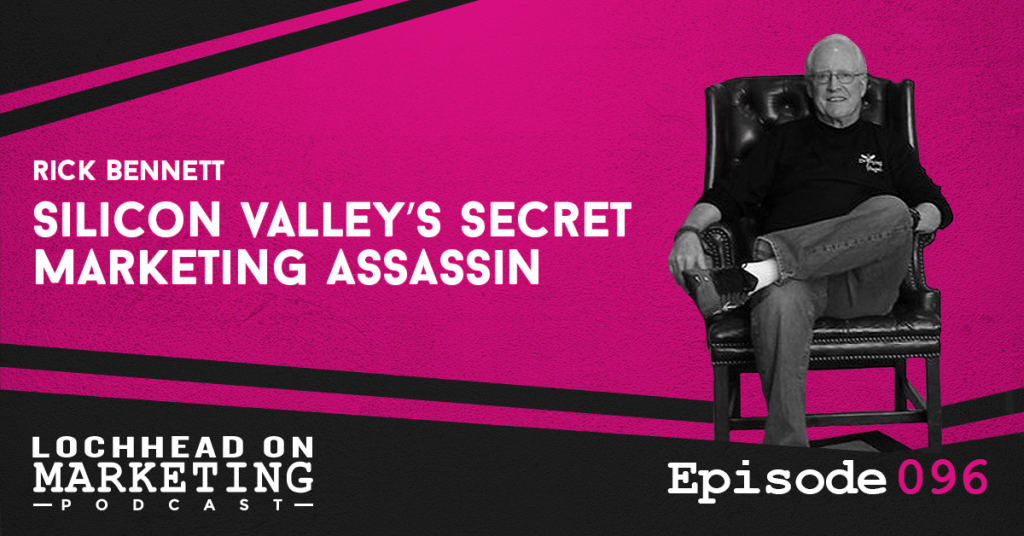
Podcast (lochheadonmarketing): Play in new window | Download (Duration: 1:06:59 — 46.0MB) | Embed
Subscribe: Apple Podcasts | Spotify | RSS | More
Advertising is a powerful thing in the world of business. Whether you have a start-up or a successful company, you still need an effective advertisement to propel your brand forward. Silicon Valley’s secret advertising weapon, Rick Bennett, is here with us today to give pieces of advice about advertising and marketing. Also, he talks about how being wise and having good decisions help us as human beings.
Technological Intimidation
Rick says that the best thing to do when advertising is to avoid saying anything that a competitor could say. You’ve got to rebut if a competitor tries to provoke you by saying he’s wrong and it’s not true. Also, he says that the trick is not to get sued for libel or slander.
“You have to use technological intimidation. You can only speak to the technological truth. We don’t call someone a liar. We can say, well, this isn’t true, and we prove why.” – Rick Bennett
Rhetorical War Gaming
Rick is a master at writing legendary headlines back in the day. Christopher asks him when is the right time to invest in an advertisement after creating a headline and then testing it. He says that rhetorical wargaming using SurveyMonkey to test a bunch of ideas is helpful and also giving a free product to the audience:
“Survey monkey is good, but the trick is the giveaway. You need to offer a free product that anybody can log on to and check out your AI. That could be very granular and atomic and just take off.” – Rick Bennett
How to Function Creatively
Christopher and Rick talk about the assault on the Capitol that happened on January 6, where several people died because of the riot. Christopher says that politics was about arguing to solve problems, and now it’s just about arguing to continue to argue. Rick agrees, and he says that we can’t change anybody’s mind, so we have to change the playing field.
“One idea that I have is that creativity and genius cannot exist in a state of anger. In other words, you get angry on either side, and you have destroyed your ability to function creatively. Creativity is a curse. That’s the way I kind of cloister myself in the pirate cottage here up in the mountainside, and I try not to let anything destroy my creativity as it is.” – Rick Bennett
To know more about Silicon Valley’s Secret Marketing Assassin Rick Bennett, download and listen to this episode.
Bio:
Rick Bennett specializes in guerrilla warfare marketing.
He’s been the secret advertising weapon to Silicon Valley entrepreneurs for over 30 years.
Two of his most spectacular successes are Oracle and Salesforce.com.
Links:
We hope you enjoyed this episode of Lochhead on Marketing™! Christopher loves hearing from his listeners. Feel free to email him, connect on Facebook, Twitter, Instagram, and subscribe on Apple Podcast! You may also subscribe to his newsletter, The Difference, for some amazing content.

